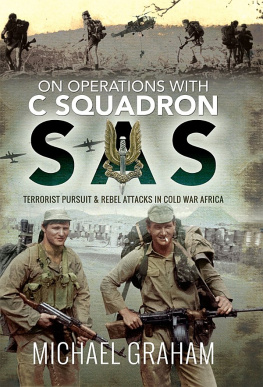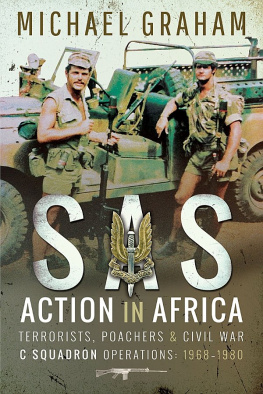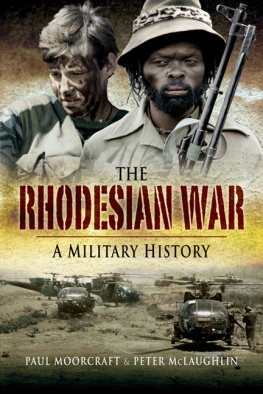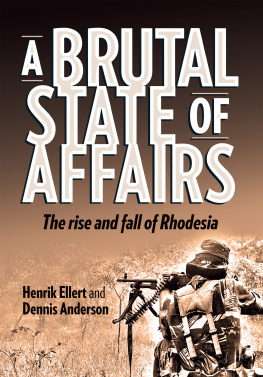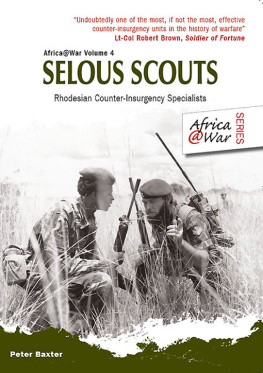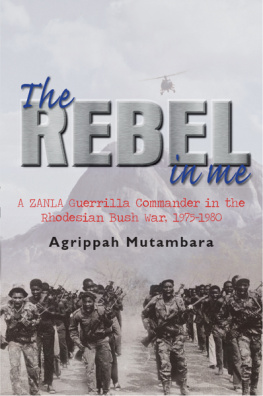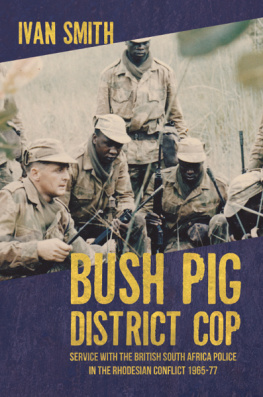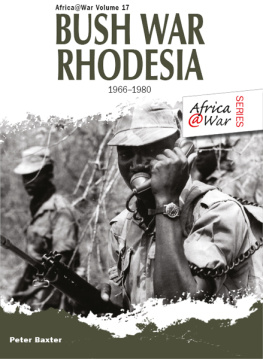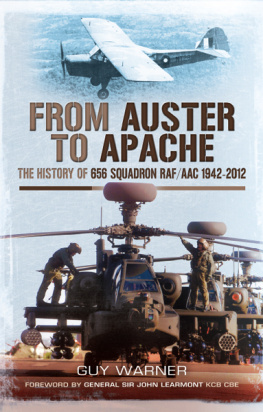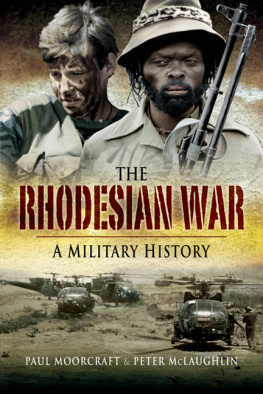On Operations with C Squadron SAS
Also by Michael Graham:
Secret SAS Missions in Africa. C Squadron operations 1968 to 1980
Pen & Sword, 2017
SAS Action in Africa. C Squadron operations 1968 to 1980
Pen & Sword, 2019
On Operations with C Squadron SAS
Terrorist Pursuit and Rebel Attacks in Cold War Africa
Michael Graham
First published in Great Britain in 2020 by
Pen & Sword Military
An imprint of
Pen & Sword Books Ltd
Yorkshire Philadelphia
Copyright The Estate of Michael Graham 2020
ISBN 978 1 52677 281 7
eISBN 978 1 52677 282 4
Mobi ISBN 978 1 52677 283 1
The right of Michael Graham to be identified as Author of this work has been asserted by him in accordance with the Copyright, Designs and Patents Act 1988.
A CIP catalogue record for this book is
available from the British Library.
All rights reserved. No part of this book may be reproduced or transmitted in any form or by any means, electronic or mechanical including photocopying, recording or by any information storage and retrieval system, without permission from the Publisher in writing.
Pen & Sword Books Limited incorporates the imprints of Atlas, Archaeology, Aviation, Discovery, Family History, Fiction, History, Maritime, Military, Military Classics, Politics, Select, Transport, True Crime, Air World, Frontline Publishing, Leo Cooper, Remember When, Seaforth Publishing, The Praetorian Press, Wharncliffe Local History, Wharncliffe Transport, Wharncliffe True Crime and White Owl.
For a complete list of Pen & Sword titles please contact
PEN & SWORD BOOKS LIMITED
47 Church Street, Barnsley, South Yorkshire, S70 2AS, England
E-mail: enquiries@pen-and-sword.co.uk
Website: www.pen-and-sword.co.uk
Or
PEN AND SWORD BOOKS
1950 Lawrence Rd, Havertown, PA 19083, USA
E-mail: Uspen-and-sword@casematepublishers.com
Website: www.penandswordbooks.com
Authors Notes and Acknowledgements
In this third and final book my objective was to share some stories of the early days of C Squadron SAS, pay tribute to the few men who kept the unit alive after the break-up of the Federation of the Rhodesias and Nyasaland, and then to describe how our brigadier went on to rebuild it into an incredible fighting force that mastered the bush environment of Africa.
There were some interesting operations with the Portuguese in those early days. Through Central Intelligence Organisation leader Ken Flower, we learned of secret political alliances, and our covert involvement would have strengthened those relationships.
Secret SAS Missions in Africa and the sequel SAS Action in Africa describe the various operations the SAS were involved in until the end in 1980. At that point the British government had washed their hands of us and communist backed Mugabe was in power in our country.
The situation was untenable for us and the regiment was disbanded.
I am grateful for a man I dont know, called Kevin, in England, sending me copies of correspondence between our SAS General the first commander of C Squadron SAS in Malaya and Margaret Thatcher the British Prime Minister. It is an interesting insight into high level politics that few of us mere mortals ever get to see, but it didnt change anything.
However, just because the regiment was disbanded the SAS story didnt end in 1980.
A large number of C Squadron members decided to go south and join the newly formed South African Special Forces known as the Recce Commando. Most of the SAS had left by 1986, but not before involvement in operations that were not only dangerous, but destructive and even disastrous.
The SAS action in Africa thus continued for another six years.
I was half way through the writing of this book when I, the SAS Major who believed he was bulletproof, suddenly discovered he wasnt at all.
One day I was happily walking the hilly bush tracks in our lovely suburb of Titirangi in Auckland with my wife Sharen, and mowing the lawns thereafter.
Seventy-two hours later I was in the local hospital having 4 litres of fluid drained from my lung cavity.
Thirty-six hours later I was having lung surgery and another 1 litres of fluid were drained from the pleura.
I was told I had cancer.
No treatment options available and I had six months maybe a bit a longer to live on planet earth.
The first half of my remaining time they said would be OK and we were told to make the most of it, because the second part would see me with ever increasing tiredness and ever decreasing energy.
Sharen and I were pragmatic about it.
No point dwelling on the millions of disappointments this news brought us.
Far better to spend what time remained for me by seeing people we loved and going to our special places in New Zealand.
But on top of that there were dozens of personal details to get sorted which we managed OK and promptly.
My wonderful brother Andy organised a lawn mowing contractor to come every second week to do our extensive lawns, and that took away what was one of the major stress points for me with the bad news.
And the second point that stressed me was finishing SAS book three.
Did I have enough time?
I ploughed on through the chapters and have to say it was a welcome distraction from the seriousness of my medical situation. I soon realised I would finish the work, but editing by Caroline who had served me so well with the first two books would take too long.
I explained this to Caroline who was disappointed but understanding, and told me to send her the chapters anyway so she could read and comment on them. In Caroline I have been blessed with a great editor, and my life has been the richer for her involvement in it.
I turned to Henry Wilson for advice.
Henry is publishing editor for Pen and Sword who have been good enough to publish my writing, and we had met in London over a jolly good lunch at the Army & Navy Club. With both of us ex-Army it was not hard to get on well and we have enjoyed the relationship ever since.
I explained my medical situation to Henry who immediately told me to send the manuscript directly to him and they would do the editing.
He said that very few of his authors used a professional editor like Caroline, and the resultant quality of my manuscripts meant they had very little to do to turn it into a book. Barnaby Blacker, Pen & Swords editor, was always so positive about my manuscripts so it was very pleasing to learn he would do the editing job.
So, thanks to Henry, the only other real stress this medical news brought was replaced with a positive and exciting situation as we debated titles, and Caroline came in with comments like the chapter about the assassination of Samora Machel was simply extraordinary.
I hope the readers agree. It was an extraordinary story.
Pen & Sword Production Manager Matt Jones and jacket design wizard Jon Wilkinson, based in Barnsley, Yorkshire, deserve special praise. Two terrific guys who do a terrific job and I was so pleased to meet them when I visited Pen & Sword in 2017. Thank you both for making my books look so good.
God Bless you all.
Mike Graham
Auckland
April 2019
Profiles
The SAS General Peter George Walls
Peter Walls was born in Salisbury, Southern Rhodesia, in 1927. His father was a First World War pilot who served with the Royal Air Force, and his son was set on a military career from the outset.
In 1945 he joined the British Army and was sent to Sandhurst for officer training. He received his commission in March 1946 and was posted to the Black Watch Regiment.
Next page
